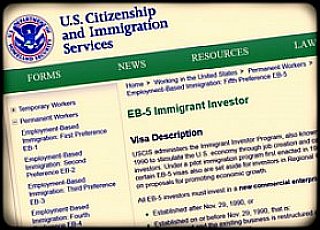
There's a lot of detailed good news emerging from U.S. Citizenship and Immigration Services these days, but some of it is hidden behind awkward, bureaucratic prose.
For example, there is the question of which applicants for adjustment of status (from nonimmigrant or illegal, to permanent resident status) are interviewed by USCIS before grants are made.
The reader might bridle and say, aren't they all interviewed? Can you get green card status simply by filling out a form?
Well, yes, sometimes you can, but the current administration is making it certain that at least two classes of aliens will be interviewed, and that's good. Previous administrations, not worrying about the impact of more numbers on our society, have often waived interviews on the dual grounds of saving money and getting more uniformity in decision-making. Now we are getting more vetting in many cases.
More specifically, in a Policy Alert, dated May 15, carrying a not-very-helpful subject line "Adjustment of Status Interview Guidelines and Waiver Criteria", we read that the new policy, stated in the double-negative:
[U]pdates the types of adjustment of status cases in which USCIS might waive the interview by removing employment-based and fiancé(e)-based adjustment cases from the list.
I assume that the list mentioned is of the kinds of cases in which interviews can be waived.
Putting it in more straight-forward English, if I am reading it correctly, from now on all cases where green cards might be issued to fiancé(e)s or immigrant workers (or investors) must be subject to an interview. That's good, because while an application may paper over a major problem a reasonably skilled interviewer may sense it right away.
It is particularly good news in the case of fiancé(e)s because of widespread immigration-marriage fraud (see here and here). In marriage fraud cases involving an alien deceiving a citizen, the alien not only gets a green card that was not deserved, the citizen involved is often battered financially and emotionally, if not physically.
On the same day, USCIS also published another Policy Alert carrying the subject line "Rescission of Guidance Regarding Tenant-Occupancy Methodology", which bears on the EB-5 program. It says:
USCIS has determined that tenant-occupancy methodologies result in a connection or nexus between the investment and jobs that is too tenuous. Therefore, USCIS no longer considers this methodology to be reasonable or a valid forecasting tool under the regulations.
Both a little background, and a translation, are needed here.
In the EB-5 program, in which an alien investor gets a family-sized set of green cards for a $500,000 investment that is accepted by DHS, but not guaranteed by the agency, the investment is supposed to create 10 jobs. One of the techniques economists had used to support the estimates of job creation was to calculate the number of jobs created, not by the original investment, but also those caused by other investors who, for example, created, using non-EB-5 funds, a restaurant in the building that had been built with EB-5 funds.
In other words, although EB-5 funds had been used only to create the structure, but not the businesses run by the tenant occupant, the jobs created by both the construction and by the tenant were to be counted toward the goal of 10.
This dubious formula has been used for years in the EB-5 program, and I recall President Obama's first USCIS Director, Alejandro Mayorkas, discussing the concept in public meetings, with his facial expressions, if not his words, suggesting that he, too, thought that this was a bit of a stretch.
The decision is welcome because it means that one of the many questionable elements in the EB-5 program will no longer be tolerated by government.
But this is a case of modified rapture, as the fine print indicates that the tenant-occupancy scam can still be used in approved and even in pending EB-5 applications, with the rule apparently applying only to new, as yet un-submitted proposals.
